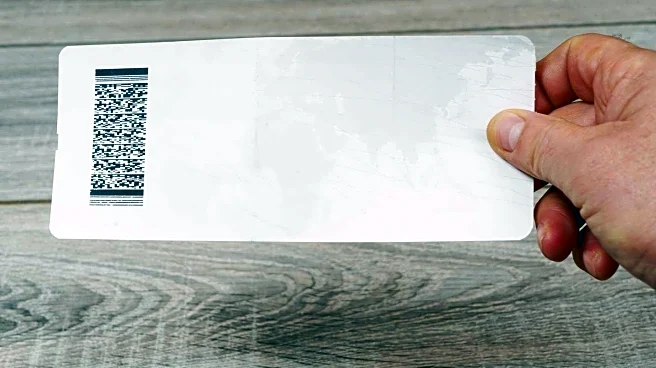What's Happening?
Ryanair has announced that it will transition to 100% digital boarding passes starting November 12, eliminating the option for passengers to obtain paper boarding passes at the airport or print them at home. This change requires passengers to use the 'myRyanair' app to generate digital boarding passes during check-in. The airline claims this move will provide a faster, smarter, and more environmentally friendly travel experience. However, the decision has sparked concerns among passengers, particularly those without smartphones or those who prefer printed passes for security against technical issues. Ryanair states that nearly 80% of its passengers already use digital passes, aligning this shift with broader industry trends towards digital solutions.
Why It's Important?
Ryanair's decision to eliminate paper boarding passes reflects a growing trend in the aviation industry towards digitalization, aiming to streamline operations and reduce environmental impact. This move could set a precedent for other airlines, potentially leading to widespread adoption of digital-only boarding processes. While this transition may enhance efficiency and sustainability, it also raises accessibility concerns for passengers who lack access to smartphones or are uncomfortable with digital technology. The shift could disproportionately affect older passengers and those in regions with limited digital infrastructure, highlighting the need for airlines to consider inclusive solutions that accommodate all travelers.
What's Next?
As Ryanair implements this change, the airline may face legal challenges or customer backlash from those who feel disadvantaged by the digital-only policy. The company will need to address these concerns, possibly by offering alternative solutions or support for passengers unable to use digital passes. Other airlines will likely monitor Ryanair's transition closely, assessing its impact on customer satisfaction and operational efficiency. The broader aviation industry may continue to explore digital innovations, such as biometric verification and digital travel credentials, which could further transform the travel experience in the coming years.
Beyond the Headlines
The shift to digital boarding passes raises ethical and legal questions about accessibility and consumer rights. Requiring passengers to use smartphones for essential travel documents may be seen as exclusionary, potentially leading to legal challenges. Additionally, the reliance on digital technology increases the risk of data privacy concerns and technical failures, which could disrupt travel plans. As the industry moves towards digital solutions, it will be crucial to balance innovation with inclusivity and security, ensuring that all passengers can benefit from technological advancements without being left behind.












